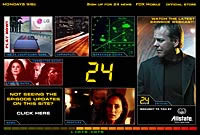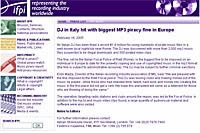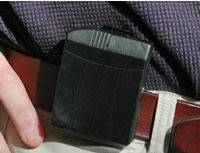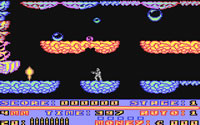 A 19-year-burglar is now enjoying an eleven month stretch at Her Majesty’s Pleasure after he was photographed burgling a house by the owner’s Webcam.
A 19-year-burglar is now enjoying an eleven month stretch at Her Majesty’s Pleasure after he was photographed burgling a house by the owner’s Webcam.
Software engineer Duncan Grisby, 30, set up the movement-activated surveillance system following a previous burglary three years before.
The Webcam was set to start filming once it registered motion, with images of the hapless burglar being safely transferred from the computer to a remote server.
The Webcam captured every movement of Benjamin Park, 19, including a handy close-up when he stared straight in the Webcam before going on to steal the computer and other equipment worth £3,719 ($7,000, Euro 5,300).
When 30-year-old Mr Grisby returned from holiday this month, the pictures were handed over to police, who instantly recognised Park, a very naughty boy already on bail for an attempted burglary in Ely.
Police tracked down Park, who was already boasting 33 previous convictions for theft, to a block of flats in Cambridge, where he was arrested as he tried to leg it from the long arm of the law.
Travers Chalk, the chairman of the Cambridge bench, sentenced Park to 11 months in prison after he admitted the offences. “You have a record which is awful, dreadful,” the magistrate told him.
Understandably, Mr Grisby wasn’t too chuffed with what he felt was a lenient sentence for a serial burglar, saying, “It is a rather pathetic sentence to hand someone like that, a career burglar.”
Although photographs of the burglar in action have been published by the police, one piece of footage that hasn’t been available was the look on Park’s face when Det Sgt Al Page, who leads the Cambridge burglary squad, showed him the Webcam shots.
 We may not win many things these days, but when it comes to downloading pirated television, us Brits can puff out our chests and proudly declare, “we’re number one!”
We may not win many things these days, but when it comes to downloading pirated television, us Brits can puff out our chests and proudly declare, “we’re number one!” The downloading frenzy has been driven by the consumer-annoying practice of releasing popular US TV shows such as “The West Wing,” “The Sopranos” and “Friends” months after they’ve been seen by our American cousins.
The downloading frenzy has been driven by the consumer-annoying practice of releasing popular US TV shows such as “The West Wing,” “The Sopranos” and “Friends” months after they’ve been seen by our American cousins. Kids today, eh? Spoilt rotten they are.
Kids today, eh? Spoilt rotten they are. A “well known” Italian DJ could be hit with a record-breaking fine of up to 1.4 million euros ($1.8 million, £968,000) for using thousands of pirate music files in a nightclub near Rome, police said on Wednesday.
A “well known” Italian DJ could be hit with a record-breaking fine of up to 1.4 million euros ($1.8 million, £968,000) for using thousands of pirate music files in a nightclub near Rome, police said on Wednesday. T-Mobile has unveiled ambitious plans to further expand its global Wi-Fi footprint, aiming to install 20,000 hotspots across the world by the end of the year, including trains.
T-Mobile has unveiled ambitious plans to further expand its global Wi-Fi footprint, aiming to install 20,000 hotspots across the world by the end of the year, including trains. Arbitron Portable People Meter and Eurisko Media Monitor selected for further field testing
Arbitron Portable People Meter and Eurisko Media Monitor selected for further field testing  To make the test as thorough as possible, hundreds of unique listening environments were generated, with RAJAR specifying several criteria which the audiometers should fulfil – these included the ability to identify all formats equally, whether music or speech, against a variety of extraneous background noises, when played at differing volume levels and regardless of whether the wearers were stationary or in motion.
To make the test as thorough as possible, hundreds of unique listening environments were generated, with RAJAR specifying several criteria which the audiometers should fulfil – these included the ability to identify all formats equally, whether music or speech, against a variety of extraneous background noises, when played at differing volume levels and regardless of whether the wearers were stationary or in motion. Despite surviving last year’s pre-Christmas BitTorrent blitz, the LokiTorrent site was finally closed down by a Dallas court yesterday.
Despite surviving last year’s pre-Christmas BitTorrent blitz, the LokiTorrent site was finally closed down by a Dallas court yesterday. If they weren’t already unpopular enough with a large part of the online music file sharers, the Recording Industry Association of America (RIAA) has managed to score a spectacular PR own goal by suing a dead woman for swapping music files.
If they weren’t already unpopular enough with a large part of the online music file sharers, the Recording Industry Association of America (RIAA) has managed to score a spectacular PR own goal by suing a dead woman for swapping music files. The most successful gaming computer of the 80s is back – this time in a teensy weensy new ‘Direct to TV’ (D2TV™) unit.
The most successful gaming computer of the 80s is back – this time in a teensy weensy new ‘Direct to TV’ (D2TV™) unit. The DTV contains the classic games: Alleykat, California Games, Championship Wrestling, Cyberdyne Warrior, Cybernoid, Cybernoid II, Eliminator, Exolon, Firelord, Gateway to Apshai, Head the Ball, Impossible Mission, Impossible Mission 2, Jumpman Junior, Marauder, Maze Mania, Mission Impossibubble, Nebulus, Netherworld, Paradroid, Pitstop, Pitstop 2, Ranarama, Speedball, Summer Games, Super Cycle, Sword of Fargoal, Uridium, Winter Games and Zynaps.
The DTV contains the classic games: Alleykat, California Games, Championship Wrestling, Cyberdyne Warrior, Cybernoid, Cybernoid II, Eliminator, Exolon, Firelord, Gateway to Apshai, Head the Ball, Impossible Mission, Impossible Mission 2, Jumpman Junior, Marauder, Maze Mania, Mission Impossibubble, Nebulus, Netherworld, Paradroid, Pitstop, Pitstop 2, Ranarama, Speedball, Summer Games, Super Cycle, Sword of Fargoal, Uridium, Winter Games and Zynaps.